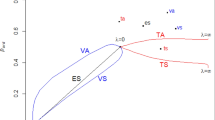Abstract
By parliamentary practice, the members of the committee reporting a bill are granted priority recognition for the purpose of moving amendments. If they seek recognition, the committee members are recognized in order of seniority. We extend the random proposer model of parliamentary bargaining by allowing for priority recognition of T > 1 committee members. In contrast to the T = 1 case considered in the literature, the payoff of the first proposer is not unique if T > 1, and even at the lower bound of the outcome continuum, it is substantially higher than with T = 1. Hence, priority recognition strikingly improves the bargaining power of the proposing committee member, and pure random proposer models overstate predictability and understate bargaining power.
Similar content being viewed by others
References
Ali S (2006) Waiting to settle: multilateral bargaining with subjective biases. J Econ Theory 127: 109–137
Ansolabehere S, Snyder J Jr, Ting M (2003) Bargaining in bicameral legislatures: when and why does malapportionment matter. Am Political Sci Rev 97(3): 471–481
Banks J (1985) Sophisticated voting outcomes and agenda control. Soc Choice Welf 1(4): 295–306
Banks J (1989) Equilibrium outcomes in two-stage amendment procedures. Am J Political Sci 33(1): 25–43
Banks J, Duggan J (2000) A bargaining model of collective choice. Am Political Sci Rev 94(1): 73–88
Banks J, Duggan J (2006) A general bargaining model of legislative policy-making. Q J Political Sci 1: 49–85
Baron D (1991a) Majoritarian incentives, pork barrel programs, and procedural control. Am J Political Sci 35(1): 57–90
Baron D (1991b) A spatial bargaining theory of government formation in parliamentary systems. Am Political Sci Rev 85(1): 137–164
Baron D (1994) A sequential choice theory perspective on legislative organization. Legis Stud Q 19(2): 267–296
Baron D (1996) A dynamic theory of collective goods programs. Am Political Sci Rev 90(2): 316–330
Baron D, Ferejohn J (1987) Bargaining and agenda formation in legislatures. Am Econ Rev 77(2): 303–309
Baron D, Ferejohn J (1989) Bargaining in legislatures. Am Political Sci Rev 83(4): 1181–1206
Bernheim B, Rangel A, Rayo L (2006) The power of the last word in legislative policy making. Econometrica 74(5): 1161–1190
Cardona D, Ponsatí C (2007) Bargaining one-dimensional social choices. J Econ Theory 137(1): 627–651
Cho S, Duggan J (2003) Uniqueness of stationary equilibria in a one-dimensional model of bargaining. J Econ Theory 113(1): 118–130
Deschler L, Johnson CW (1997) Deschler’s precedents of the US House of representatives. Government Printing Office, Washington, DC
Duggan J (2006) Endogenous voting agendas. Soc Choice Welf 27(3): 495–530
Eraslan H (2002) Uniqueness of stationary equilibrium payoffs in the Baron–Ferejohn model. J Econ Theory 103(1): 11–30
Eraslan H, McLennan A (2006) Uniqueness of stationary equilibrium payoffs in coalitional bargaining
Evans R (1997) Coalitional bargaining with competition to make offers. Games Econ Behav 19(2): 211–220
Gilligan T, Krehbiel K (1989) Asymmetric information and legislative rules with a heterogeneous committee. Am J Political Sci 33(2): 459–490
Harrington J (1990) The power of the proposal maker in a model of endogenous agenda formation. Public Choice 64(1): 1–20
Jackson M, Moselle B (2002) Coalition and party formation in a legislative voting game. J Econ Theory 103(1): 49–87
Kalandrakis A (2004a) A three-player dynamic majoritarian bargaining game. J Econ Theory 116(2): 294–322
Kalandrakis T (2004b) Bicameral winning coalitions and equilibrium federal legislatures. Legis Stud Q 29(1): 49–79
Kalandrakis T (2006) Regularity of pure strategy equilibrium points in a class of bargaining games. Econ Theory 28(2): 309–329
Knight B (2005) Estimating the value of proposal power. Am Econ Rev 95(5): 1639–1652
Kornberg A (1964) The rules of the game in the Canadian house of commons. J Politics 26(2): 358–380
Mailath GJ, Samuelson L (2006) Repeated games and reputations: long-run relationships. Oxford University Press, Oxford
McCarty N (2000a) Presidential pork: executive veto power and distributive politics. Am Political Sci Rev 94(1): 117–129
McCarty N (2000b) Proposal rights, veto rights, and political bargaining. Am J Political Sci 44(3): 506–522
McKelvey R, Niemi R (1978) A multistage game representation of sophisticated voting for binary procedures. J Econ Theory 18(1): 1–22
Montero M (2007) Inequity aversion may increase inequity. Econ J 117(519): 192–204
Norman P (2002) Legislative bargaining and coalition formation. J Econ Theory 102(2): 322–353
Winter E (1994a) The demand commitment bargaining and snowballing cooperation. Econ Theory 4(2): 255–273
Winter E (1994b) Non-cooperative bargaining in natural monopolies. J Econ Theory 64: 202–220
Winter E (1996) Voting and vetoing. Am Political Sci Rev 90(4): 813–823
Yildirim H (2007) Proposal power and majority rule in multilateral bargaining with costly recognition. J Econ Theory 136(1): 167–196
Author information
Authors and Affiliations
Corresponding author
Rights and permissions
About this article
Cite this article
Breitmoser, Y. Parliamentary bargaining with priority recognition for committee members. Soc Choice Welf 37, 149–169 (2011). https://doi.org/10.1007/s00355-010-0486-1
Received:
Accepted:
Published:
Issue Date:
DOI: https://doi.org/10.1007/s00355-010-0486-1




